Are Chinese gods more human? How divine beliefs shape our world
Looking at paintings and talking with his daughters prompts economics professor Li Jingkui to reflect on how humans are programmed to think of the gods as all-powerful and needing to be pleased, whether in the East or West. And this mindset in turn has influenced our perception of various aspects of life, leading to our economic and political systems.
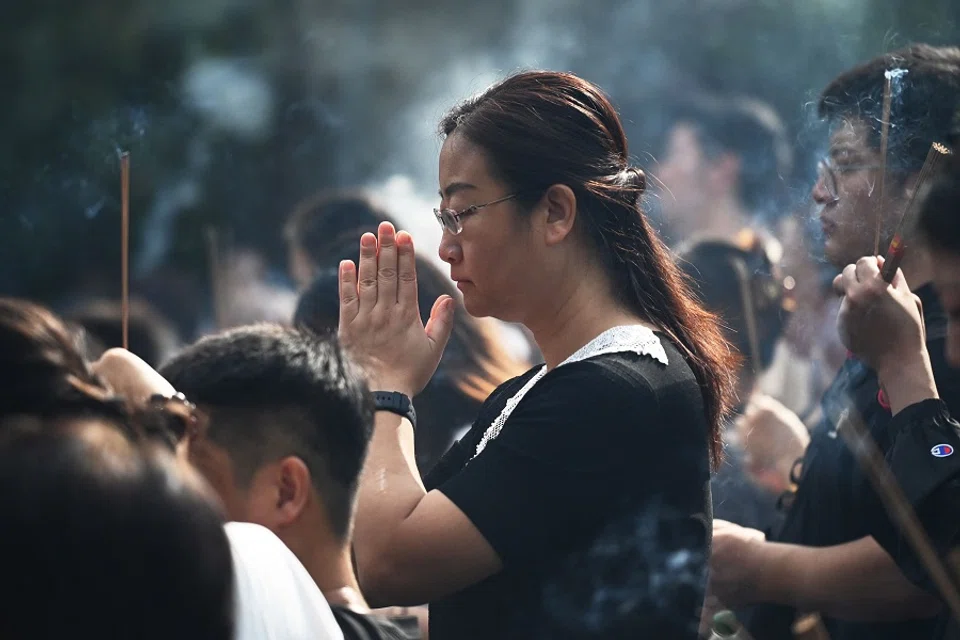
One weekend, I was with my wife and two daughters admiring two world-renowned paintings — The Origin of the Milky Way by Italian Renaissance painter Tintoretto, and The Judgement of Paris by Flemish painter Peter Paul Rubens. And as this economist talked with my daughters, it sparked a deep reflection in me.
The Origin of the Milky Way was commissioned by Holy Roman Emperor Rudolf II.
In the painting, the Greek god Zeus carries a baby and discreetly approaches his sleeping wife Hera. The hungry baby greedily sucks on Hera’s breast milk, and Hera wakes up from the pain and tries to push the child away. The milk that squirts out from her left breast is scattered in the air, and some of it becomes stars, eventually forming the Milky Way. This is the origin of the English word “galaxy”, which comes from the Greek word “gala”, meaning milk.
The baby is Heracles, the famous hero in Greek mythology. But he is not Hera’s son; he is the child of Zeus and the mortal woman Alcmene, the wife of General Amphitryon.
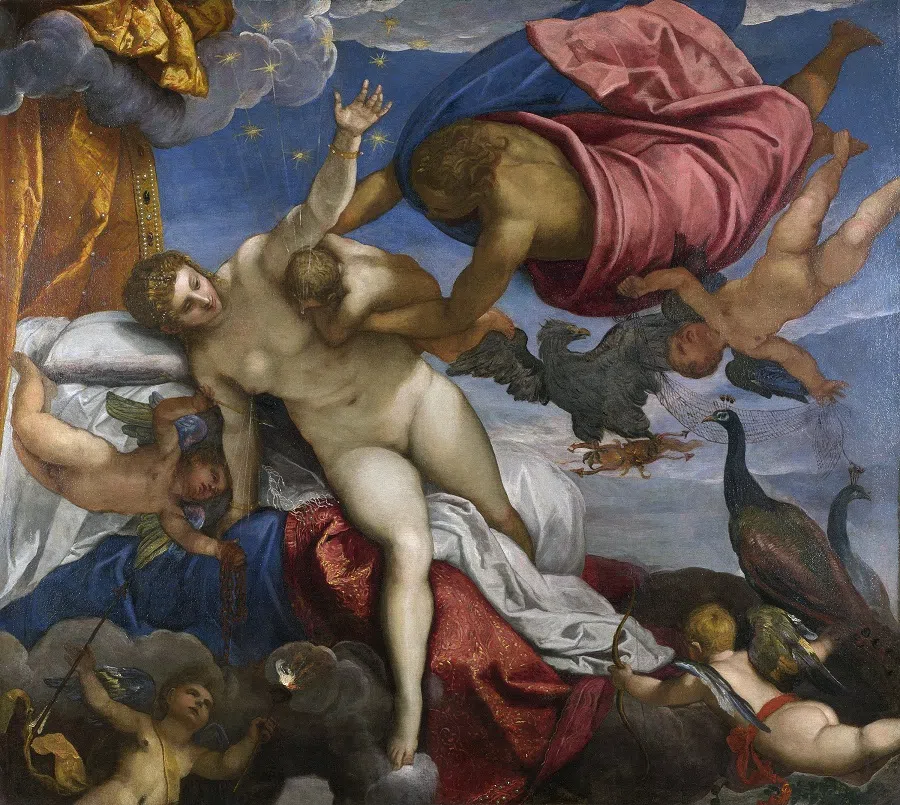
The story goes like this: Zeus looks down on earth from above and has his eye on Alcmene, but the faithful Alcmene is deeply in love with her husband Amphitryon and rejects Zeus’s advances. Undeterred, Zeus hatches a deceitful plan. Transforming himself into the exact likeness of Amphitryon, he deceives Alcmene and fulfills his desire. The truth is revealed only when Amphitryon returns from the battlefield, leaving the innocent couple reeling from the betrayal.
Adding to their distress, Alcmene is now pregnant with a god’s child. After the child’s birth, Hera, the goddess of marriage and childbirth, enraged by Zeus’s infidelity, prevents Alcmene from producing milk. In a secret act of paternal love, Zeus then places his infant son at Hera’s breast while she sleeps, allowing the child to drink the divine milk of immortality.
The Judgement of Paris, on the other hand, is about the famed Trojan War.
The Greek sea goddess Thetis and warrior Peleus held a grand wedding ceremony on Mount Olympus. All the gods were invited except one — Eris, the goddess of discord. Angered, she came uninvited, and left at the banquet a golden apple with the inscription “to the most beautiful”.
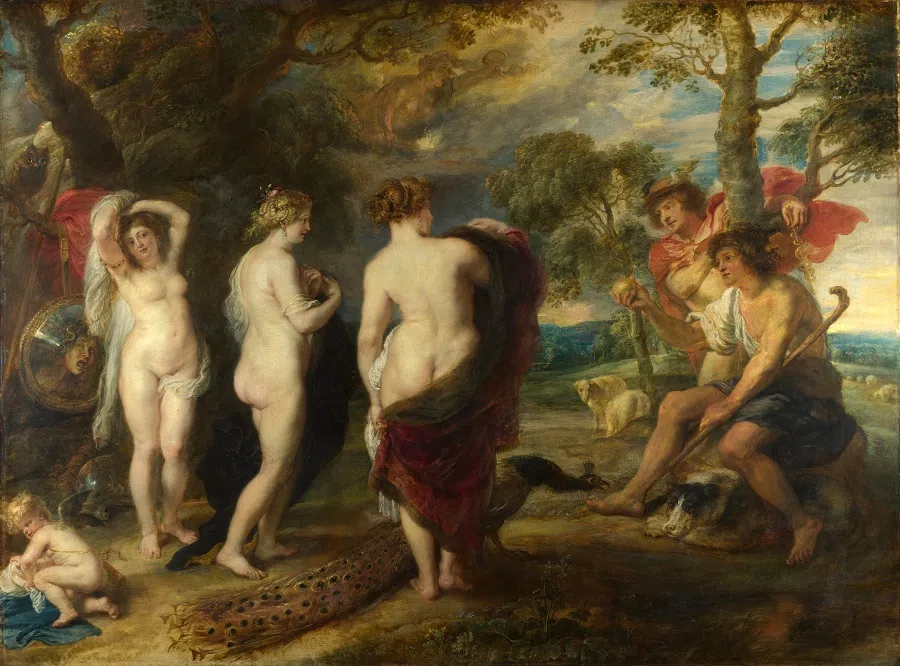
Three goddesses — Hera, Zeus’s wife; Athena, the goddess of wisdom and war; and Aphrodite, the goddess of beauty and love — each claimed the apple, sparking a divine dispute. Fatefully, the task of determining who was the fairest goddess fell upon Paris, the prince of Troy.
Hermes led the goddesses to Mount Ida, where Paris tended his flocks — the scene depicted in the painting. Offered bribes by each goddess, Paris ultimately chose Aphrodite’s gift — marriage to the most beautiful woman in the world —and awarded her the golden apple. This decision ignited the wrath of Hera and Athena, ultimately leading to the Trojan War.
Indeed, Chinese deities seem to be less flawed than Greek gods and are often more relevant to our daily lives.
Reflections from my daughters
After admiring the two paintings and listening to the ancient Greek myths I told them, my two daughters had a lot to say about the Greek gods.
My younger daughter, who is in primary school, said, “Ancient Greek gods are so horrible! Unlike our Chinese deities, who are all good.”
My elder daughter chimed in, “That’s right! During the Spring Festival, grandpa and grandma pray to the Kitchen God and set off firecrackers to welcome the God of Wealth on the fifth day of the Lunar New Year. They also go to the temple to offer incense to Guanyin, who blesses us with peace and safety. Some people even pray for children!”
Indeed, Chinese deities seem to be less flawed than Greek gods and are often more relevant to our daily lives. Interestingly, the deities we pray to are often not the most powerful ones — be it the village gods in the north or the city gods in the south, people usually worship lower-ranked deities. In fact, higher-ranked deities like the Jade Emperor receive less incense because he does not handle specific affairs of the mortals.
“However, it seems like we all have to please the gods. Offering incense is one way to do so, and so is donating money to the temple. In other words, if you don’t bribe the deities, they will not help you,” my elder daughter mused.

Upon hearing this, my wife subtly redirected our daughters’ attention, wanting to guide them towards the right perspective and quickly changed the subject.
But my children’s words gave me much food for thought.
China’s transformations
According to Japanese historian and sinologist Naitō Konan, China experienced three major transformations in history.
The first transformation occurred during the transition from the Shang to the Zhou dynasty. The Zhou, supplanting the Shang, dramatically altered the emphasis on gods and spirits. The Duke of Zhou’s reforms established a feudal system integrating family and state — a system that evolved through the Qin and Han dynasties, moving from feudalism to a prefecture/county structure. However, the core concept of a unified family and state remained.
The second transformation was the Tang-Song transition, which marked the end of aristocracy in Chinese history.
The third transformation is happening in modern times: the “great changes unseen in three thousand years”, referring to the collision and convergence of the East and West. We are still in the midst of this process today.

Faced with “great changes unseen in three thousand years”, modern China has continually sought paths to national survival. From “learning from the barbarians to subdue them” to “Chinese learning as substance, Western learning for application”, then to “reform and strengthen the nation” and finally to Chinese revolutionary Chen Duxiu’s call for “Mr Democracy” and “Mr Science”, China has ultimately embraced the pursuit of the “Four Modernisations”.
After over 40 years of reform and opening up, China’s impressive economic development might provide some comfort to our ancestors. However, the journey of reflection is ongoing, as we continue to seek a modernisation path that aligns with China’s realities while integrating with the international community.
... if the deities’ power is wielded so justly, why do we still burn incense, kowtow and offer red packets to them?
Differences between East and West
From these Eastern and Western myths, we see a difference in psychological structures.
The flaws of ancient Greek gods are in fact a reflection of human shortcomings. And all of these gods — whether Zeus, Hera, Athena or Venus — as long as they possess power, they will abuse it and bring terrible disasters upon humanity. This psyche is reflected in how Westerners perceive economic and social realities.
Chinese deities likewise possess power, but we perceive them as benevolent beings who will not harm us with their power. Yet, we seldom consider this: if the deities’ power is wielded so justly, why do we still burn incense, kowtow and offer red packets to them?
Actually, deep down, we do not believe that the deities are just; we think that they are just as selfish as us, and will only use their power to help us if we please them. After all, this power is not entirely theirs, and some of it may even expire or become ineffective over time. This psyche also affects our perception of economic and social realities.
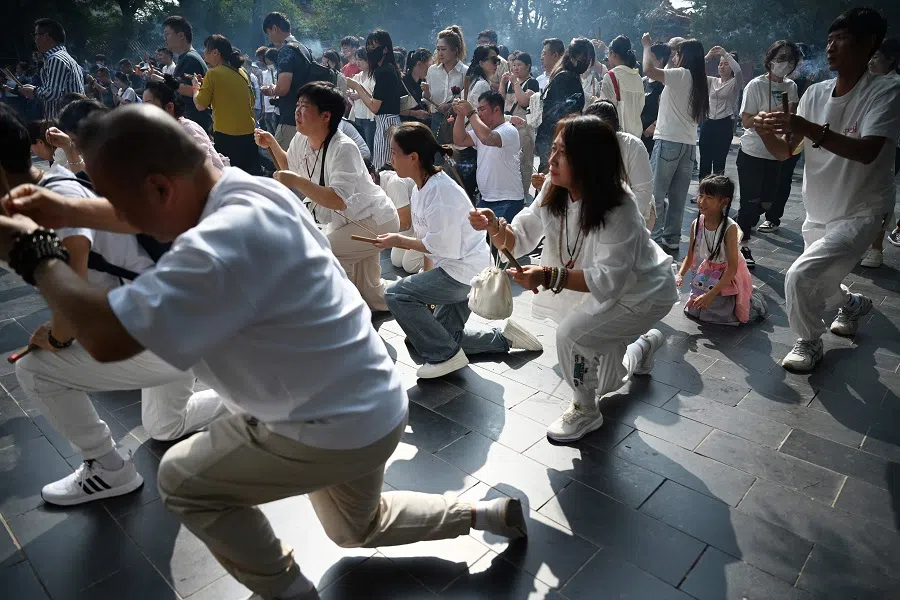
That is to say, our political and economic structures are essentially built upon these psyches. Conversely, perhaps these structures, initially established in ancient times and shaped by the ruling class’s emotional orientations and interest distribution, gradually imprinted themselves on our psyches, becoming culturally ingrained. Essentially, political and economic structures became internalised into our psychological framework.
However, tracing the evolution of Eastern and Western mythologies suggests the causal relationship may flow from psyche to structure, rather than the reverse. In other words, evolving psychological frameworks influence the development of political and economic structures, with both subsequently reinforcing each other.
Speaking to these youths, I realised that in the short span of just two decades, the customs and psychological orientations of the entire village had changed a lot.
How mythology affects psyche
Over some 40 years of reform and opening up, the market economy has begun to gradually loosen this traditional psyche.
When I returned to my rural hometown in the north this Spring Festival, many young people, who mostly work in big cities, had also returned to the village for just a few days over the Lunar New Year. Speaking to these youths, I realised that in the short span of just two decades, the customs and psychological orientations of the entire village had changed a lot.
They no longer adhere to many rural traditions as rigidly as the previous generation, and their values also differ significantly from those of their elders. They no longer have strong attachments to the land, and as labour division in rural society deepens, kinship bonds between people are also weakening.
Just as we can read ancient Greek myths today and still offer incense to the Kitchen God during the Spring Festival, there is growing conflict and interaction between Eastern and Western deities and gods in our psyche.
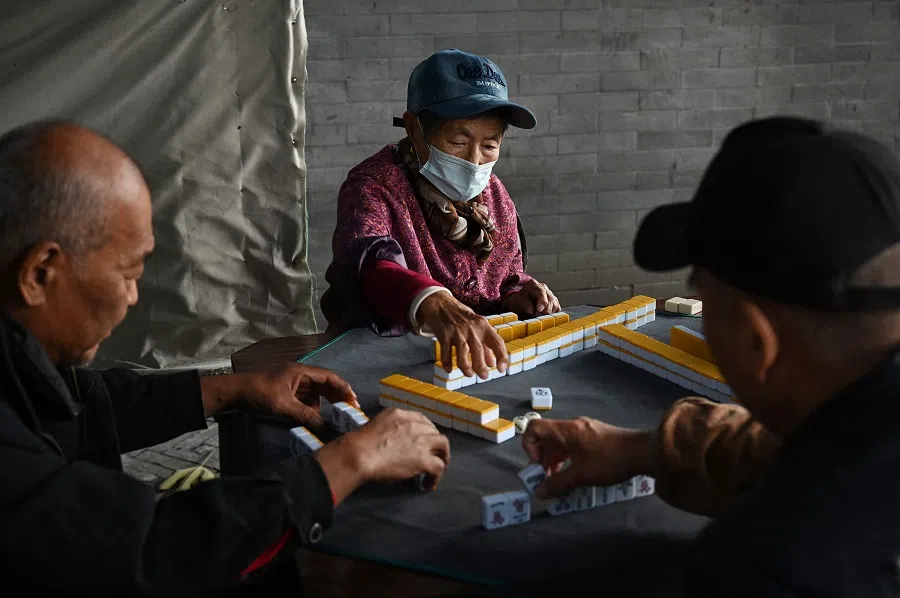
I sense a deep-seated confusion within them about their future. They are hesitant to abandon their hometown, yet unsure of what path to take if they do. They often talk about settling in the city while dreaming of building a beautiful house on their ancestral land in the village, even though these houses are rarely occupied.
It is said that many employees at tech giants who earn millions a year do not even get to meet the village elders when they return to their hometown, but someone working in a county finance bureau receives a lot of praise. I believe that these are true stories. Just as we can read ancient Greek myths today and still offer incense to the Kitchen God during the Spring Festival, there is growing conflict and interaction between Eastern and Western deities and gods in our psyche.
As for who will prevail, it may be difficult to tell for a long time to come. But what is certain is that during this “great changes unseen in a thousand years”, the clash between these two mythologies, and the beliefs that fuel them, will continue to unfold.
This article was first published in Chinese by Caixin Global as “藏在东西方神话里的社会发展密码”. Caixin Global is one of the most respected sources for macroeconomic, financial and business news and information about China.






